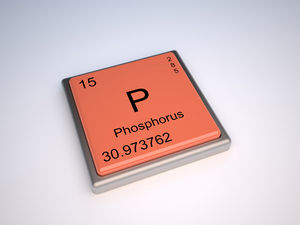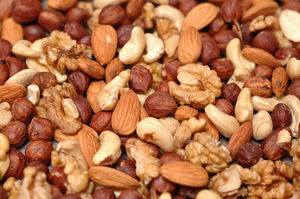Phosphorus
| See Also | Minerals |
|---|
Phosphorus is a mineral found in the body that is important for building strong bones and teeth (along with calcium), promotes energy metabolism as it is necessary for B-complex vitamin utilization, promotes growth, maintenance and repair of all body tissues, buffers body fluids for acid-base balance, and acidifies the urine and reduces the risk of kidney stones.[1]. Dietary phosphorus is absorbed in the small bowel.
Contents
Food Sources
The following foods are natural sources of phosphorus. For a more expansive list on food sources of specific nutrients visit Health Canada's Dietary Reference Intakes for Elements or USDA's National Nutrient Database
Other food sources include:[2]
- grains: whole grain products
- protein sources: calf liver, poultry, red meat, sardines, scallops, tuna
- vegetables: beans, peas, soybeans
- dairy: cheddar cheese, milk, milk products, eggs
- Other sources include: almonds, peanuts, pumpkin seeds, sunflower seeds, Homeopathic Phosphorus
Uses
Conditions which may/individuals who may require additional phosphorus include: [1]
| Article | No Rash Decision Towards Phosphorus for Shingles, NDNR; 2013 February |
|---|
- Prolonged vomiting
- Inadequate caloric or dietary intake or increased nutritional requirement
- Taking excessive amounts of antacids
- Chronic wasting illness
- Stress. People under excess stress for prolonged periods
- People who have had recent urgery
- Liver disease
- Hyperparathyroidism
- Alcoholism
Deficiency Symptoms
- bone pain
- loss of appetite
- weakness
- easily broken bones
Excess Symptoms
- seizures, heartbeat irregularities, shortness of breath
- overconsumption may lead to calcium excretion and eventually lead to osteoporosis
Adverse reactions or side effects of taking phosphorus may include:
- abdominal pain
- bone or joint pain
- breathing problems
- confusion
- convulsions
- decreased volume of daily urine output
- fast, slow, or irregular heartbeat
- muscle cramps
- numbness or tingling in hands and feet
- tremor
- unusual thirst
Assessment Procedure
Lab test to detect deficiency: [1]
Prescribing Considerations
- Phosphorus is available in many forms. Sodium phosphate is available as monobasic, dibasic, and tribasic sodium phosphate. Potassium phosphate is available as monobasic, dibasic, tribasic, potassium phosphate. Some preparations have a mixture of different forms. Use of these salts for treatment of phosphorus deficiency requires medical supervision.
- Calcium phosphate salts are mainly used as calcium supplements and come in tribasic and dibasic calcium phosphate.
- Some homeopathics are phosphate salts (ex. Kali phosphoricum, Ferrum phosphoricum, Magnesium phosphorica, and Natrum phosphoricum). Phosphorus is also prescribed homeopathically.
- 1mL of milk contains approximately 1mg of phosphorus [3].
- The recommended dosages varies based on age and health status. To determine what your specific requirements are talk to your naturopathic doctor or other trained medical professional
Safety
- Adults Over 55 Years: No problems are expected.
- Pregnancy: Take under doctor's supervision only and not in megadoses.
- Breastfeeding: Take under doctor's supervision only and not in megadoses.
- Contraindications: kidney disease, kidney stones (made up of magnesium ammonium phosphate)
- Consult your doctor if you have: hypoparathyroidism, osteomalacia, acute pancreatitis, chronic kidney disease, rickets, adrenal insufficiency (Addison's Disease), dehydration, severe burns, heart disease, edema, high blood pressure, toxemia of pregnancy
Drug Interactions
- Drug Interactions include:[1]
- Anabolic Steroids - Increases risk of edema.
- Antacids with aluminum or magnesium - May prevent absorption of phosphates.
- Calcium-containing Supplements and Antacids' - May decrease phophate absorption.
- Captopril - Increases risk of too much potassium (hyperkalemia).
- Corticosteroids - Decreases phosphate absorption.
- Cortisone Drugs or ACTH - Increases serum sodium.
- Digitalis Preparations - Increases risk of too much potassium (hyperkalemia).
- Dilantin - May decrease phosphate absorption.
- Enalapril - Increases risk of too much potassium (hyperkalemia).
- Salicylates - May increase plasma concentration of salicylates.
- Testosterone - Increases risk of edema.
Nutrient Interactions
- Nutrient Interactions include: [1]

